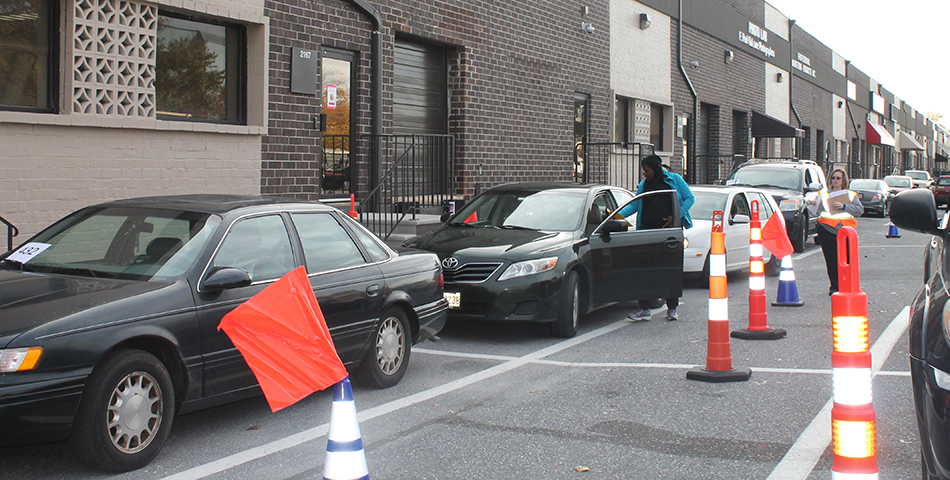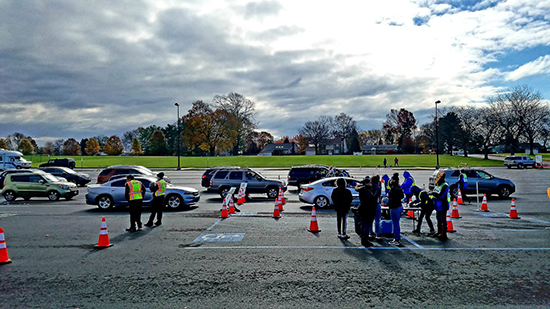Operation Shortbread Is Not Your ‘Cookie Cutter’ MCM Exercise
Posted on by
December 4 is National Cookie Day, which—from a public health perspective—is what makes the scratch-made story of Baltimore County Department of Health and Human Services’ Operation Shortbread a fitting one to tell this time of year. What do cookies have to do with public health, you ask? Before we answer that question, let’s begin with a brief introduction to the topic of medical countermeasures (MCMs).
Medical Countermeasure Readiness
In a typical MCM readiness exercise, state and local public health departments will set up a point-of-dispensing location (or POD) and hand out a placebo—sometimes candy—to employees or volunteers as they pass through.
In a real emergency, health departments might activate a POD to dispense MCMs in the form of medicines, including antibiotics, vaccines, medical supplies, and personal protective equipment. The U.S. Food and Drug Administration regulates MCMs, which are used to diagnose, prevent, protect from, or treat people in a public health emergency. CDC’s Public Health Emergency Preparedness (PHEP) program supports state and local jurisdictions in their work to strengthen their capabilities1 to receive, distribute, and dispense MCMs during an emergency.
Thinking outside the box
There is no shortage of examples of state and local jurisdictions establishing PODs in response to an emergency. Some recent ones include the establishment of PODs in Florida and Georgia after Hurricane Michael2 and during the 2017-2018 flu season in Connecticut.
However, real-life occasions to demonstrate MCM operational readiness are infrequent3; so, public health departments look for opportunities—like flu season—to practice their mass dispensing capabilities and engage with and prepare communities. The Georgia Department of Public Health (DPH) substituted flu shots for fries in September, working with local public health departments in north Georgia to open a “Drive-thru Flu Shot Clinic4.” Eight hundred miles away, the City of Bethlehem (PA) Health Bureau used a POD to vaccinate 683 people at a clinic held for just three hours, on one day, at a local middle school.

Meanwhile in Baltimore County, there’s nothing “cookie cutter” about how the health department tests their MCM plans and procedures.
Operation Shortbread
Operation Shortbread was the name given to a MCM exercise held in Baltimore County for the past three years. This is a bulk dispensing exercise for closed PODs. Closed PODs are public and private locations that have agreed to dispense medications, generally during a public health emergency, to people who work or reside in the area.
What made the exercise unique is that instead of dispensing boxes of fake pills to hundreds of volunteers, they handed out boxes of Girl Scout cookies to troop leaders. Logistically, trading cookies for MCMs was almost a perfect match because the size and weight of a case of cookies is almost identical to a case of bottles of antibiotics. The delivery truck dropped off 18 pallets of cookies—the same amount would be delivered in an actual anthrax incident.
Adding to the coincidence, the Girl Scouts have one “depot day” where they pick up the first round of cookies and then return to resupply over a 45-day period. This, too, is similar to what would happen over a 50-day distribution of antibiotics in response to an anthrax release.
Operational Shortbread was a success, with 1,441 cases distributed in four hours on depot day, and 7,602 cases distributed over the next six weeks, simulating 760,200 courses of antibiotics. What’s more, the exercise staff found ways to make distribution more efficient in the future, such as the need to rotate staff to counter mental fatigue and the need for a dedicated electronic inventory system.
These lessons learned could very well save time and lives in the event of a real emergency. In the meantime, they help get cookies into Baltimore-area pantries with greater speed and efficiency.
References
- Public Health Emergency Preparedness and Response Capabilities: https://www.cdc.gov/cpr/readiness/capabilities.htm
- Coordinated State, Local and Federal Response to Hurricane Michael: https://www.fema.gov/news-release/2018/10/14/coordinated-state-local-and-federal-response-hurricane-michael
- Use of Medical Countermeasures in Small-Scale Emergency Responses: https://ajph.aphapublications.org/doi/10.2105/AJPH.2018.304491
- Convenient flu shots offered at North Georgia’s drive-thru clinics: https://dph.georgia.gov/blog/2018-09-28/convenient-flu-shots-offered-north-georgias-drive-thru-clinics
5 comments on “Operation Shortbread Is Not Your ‘Cookie Cutter’ MCM Exercise”
Comments listed below are posted by individuals not associated with CDC, unless otherwise stated. These comments do not represent the official views of CDC, and CDC does not guarantee that any information posted by individuals on this site is correct, and disclaims any liability for any loss or damage resulting from reliance on any such information. Read more about our comment policy ».
Public Health dispensing sugar??
was any particular type of cookie used? LOL… I think they weigh between 7 and 9 oz.!!! nurse Ann
How exactly des this process work? Do the volunteers and exercise staff pick up at the POD and deliver to another location?
I think that practice is paramount for this kind of public health readiness. One of my concerns is that handing out cookies to a compliant and calm population is probably quite different than vaccinating a chaotic and fearful population during a serious and scary outbreak. Another one of my concerns is that much of the population are not aware of the presence of the CDC in their community, and probably would be wholly uninformed or unprepared during a real life outbreak. I understand that during a real life outbreak, the local population would be educated and directed in real time, but I think it would be prudent for these exercises to address education of the public of the presence and role of the CDC in their community, along with ironing out wrinkles in the department, itself. My last concern is that the 7, 602 boxes of cookies were distributed over a six week period. I expect that a much more time sensitive response would be required for a serious outbreak.
My concerns aside, I am glad to know that the CDC is around and active, preparing to move when the community is at risk.
2020 Follow Up: this cookie exercise was designed NOT for public MCM distrivution but for Closed PODS. Baltimore County activated this LBSS operation in March 2020 and we have distributed millions of pieces of PPE to our closed POD partners (hospitals, nursing homes, assisted living etc) It has worked seamlessly thanks to our drills and exercises.